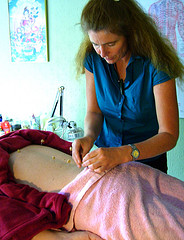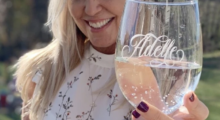 Read part one of my interview with Dr. Lael Conway Duncan, where we discuss her work at Good Medicine, integrative medicine, and the emerging practice of private medical advocacy and guidance.
Read part one of my interview with Dr. Lael Conway Duncan, where we discuss her work at Good Medicine, integrative medicine, and the emerging practice of private medical advocacy and guidance.
Katie Ryan: What are some specific situations you’ve had working with end-of-life patients?
Dr. Lael Duncan: Well, we do a lot of different kinds of work for patients and their families—primarily dealing with complex medical decisions, legal issues, and help with finding proper nursing.
Just this past year, we worked with a woman who was around seventy and was diagnosed with ovarian cancer six years prior. She had done very well with chemotherapy, her medications were working well, and she always stayed active after chemo, which is a very good sign. She became suddenly ill, though, with severe symptoms while she was travelling and visiting her family here in San Francisco. Within forty-eight hours, it suddenly became obvious that her cancer was progressing rapidly.
In many ways, her family received the news unexpectedly after getting comfortable with the idea of a controllable form of cancer, but they soon came to the realization that this was likely going to be the last phase of life for her. I was contacted by one of her children and asked to help them better understand what physicians were saying, what treatments she might or might not be able to receive—basically communicating in a simpler way what the doctors were saying.
We also helped them with the technical aspects of the process and were able to provide a lot of supportive counseling in terms of anticipating what was going to happen for their mother and what care options would be surrounding that. We then discussed the definitions of hospice and palliative care, the legal documents they would need to arrange, and a lot of general logistical matter; but more than anything, we provided a great deal of emotional support and intensive discussions about being a caregiver and how to maintain your own health throughout the process.
Katie: That brings up an important topic: what do you suggest people do when they are dealing with a loved one who is dying?
Lael: Protect yourself from becoming truly exhausted. It is so important to take care of yourself physically and emotionally to stay engaged and attached to the people who are most supportive for you in that situation. Now, it is normal to withdraw from most social situations and stick with close friends and family. Getting support from too many people can be overwhelming and may put you in danger of spreading yourself too thin. You want to identify people who are supportive for you, can provide relief, or can help you with logistical details.
“Getting support from too many people can be overwhelming and may put you in danger of spreading yourself too thin.”
Another important thing to realize is that the intensity of what you’re feeling is at times going to be unbearable and that there might not be a particular solution. The time before a loved one has passed is always going to difficult to deal with when you know the end is in sight.
Katie: That’s interesting because when we talk about the grief process, it almost always has to do with the aftermath of a loved one’s death.
Lael: Once the death has happened, the normal pathway of grief can begin. You are often well prepared emotionally or knew it was happening, so a healthy grief process can start with sadness and move through the stages. In the beforehand time, however, you experience a type of grief that is incomprehensible to the human psyche because you need to cope with the uncertainty of the situation. We find it very hard to go on with normal processes in our lives, and the little things tend to weigh on our subconscious because we are waiting for something to happen.
How you handle this beforehand time can deeply impact the aftermath based on what information you have. You ask questions like, did I share experiences with that person that have meaning? Did I leave them with the sense that I care for and support them? This part, about learning to communicate with a dying person and respecting their needs, is crucial in order for them to feel that they are worthwhile and independent during the end of their life.
Katie: I never quite thought of it that way before because typically, we want to take care of everything and make that person as comfortable as possible.
Lael: Yes, you have to let them help other people near the end by giving advice and maintaining a role because they need to feel that they are still contributing. When everyone takes over every aspect, the dying person tends to feel that their life isn’t worthwhile; they feel like they’re not doing anything. And really, that’s not a totally positive self-concept to have at the end of one’s life.
It’s an end-of-life setting that’s different because the pure compassion of the caregivers and the yearning of the dying person to provide a purpose are two forces that need to be balanced in order for that person to feel active and connected.
Katie: What is your idea of a “good death”?
Lael: People have written different things about that. One palliative care physician turns that phrase into a “better death.” At least in our society, it’s not a good thing (at best a neutral thing) to die. If you’re old and die in your sleep, there is not a great deal of unusual grief or sadness because it comes at an appropriate time and seems like a reasonable thing. The death of a young person is never viewed as expected or good, especially in Western society. Particularly in the death of young person or child, looking for a better death is something more reasonable to strive for.
In most cases, we can meet some of the needs of dying person, their family, and can lay the groundwork for a healthy recovery for those who survive. There is usually a greater degree of understanding and acceptance for a person who’s dying with the support of special counseling or religious services because they achieve some piece of mind around the issue.
“It is very often true that you will die the way you lived.”
It is very often true that you will die the way you lived. If you have a strong and forceful personality, you will face your death that way, with a sort of fortitude or anger and denial and sense of being cheated. A thoughtful introspective person has a greater degree of natural patience and will have a very different feeling about the end of their life based on that personality type. Frequently, that turns out to be true.
Katie: Have you seen this among your clients before?
Lael: I have seen it, but I have also seen people gain flexibility. Some can be in denial until their very last day, which can sometimes be the most difficult situation. The families are unable to connect with that dying person because they continue to deny it. This often leaves survivors with a sense of incompleteness, whereas a person with a more philosophical approach will be open to communicating about their experience and there is less interpersonal anxiety. You could say that that is, generally speaking, a better death experience on the whole.
Katie: So, not to promote a personality change, but it does sound like certain personalities are better at coping with death.
 Lael: You can work much easier with them and the family when they are more accepting of the situation. Most families I work with are of that type because they come to me for support. A patient in total denial will not want to work with someone like me who pulls things together, but I certainly can help with those coping with the situation.
Lael: You can work much easier with them and the family when they are more accepting of the situation. Most families I work with are of that type because they come to me for support. A patient in total denial will not want to work with someone like me who pulls things together, but I certainly can help with those coping with the situation.
Katie: Is there anything else you’d like to add about Good Medicine or coping strategies?
Lael: Paying attention to needs of a dying person in a particular way is very important in working through a lengthy and difficult process. Our team is composed of all professional doctors and nurses with a high degree of integrity and experience that we bring to the situation and apply to whatever the patient needs. At the age of fifty, someone may ask about what type of screenings they should get and I only have to answer a few questions. In other cases, a person with a complicated surgery will need help going on for days or weeks, but overall, our services are very flexible.
Katie: Thanks Dr. Duncan! It was great speaking with you.

 Interview with Dr. Duncan, Part Two
Interview with Dr. Duncan, Part Two


 Funeral Home Owner Chris Johnson Spending Halloween in Jail
Funeral Home Owner Chris Johnson Spending Halloween in Jail
 Our Monthly Tip: Toast a Loved One with a Personalized Glass
Our Monthly Tip: Toast a Loved One with a Personalized Glass
 My Cousin’s Death Taught Me the Meaning of Life
My Cousin’s Death Taught Me the Meaning of Life














